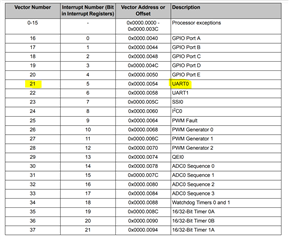Hi,
I am a newbie on the TI RTOS but my system have got 6 UART and Ethernet. I must manage the system with OS.
On TI RTOS, I would like to detect the end on the trame to select RX or TX on RS485
A lot of post about this topic without a real answer.
For begining I modified the mutex example.
/*
* Copyright (c) 2015-2016, Texas Instruments Incorporated
* All rights reserved.
*
* Redistribution and use in source and binary forms, with or without
* modification, are permitted provided that the following conditions
* are met:
*
* * Redistributions of source code must retain the above copyright
* notice, this list of conditions and the following disclaimer.
*
* * Redistributions in binary form must reproduce the above copyright
* notice, this list of conditions and the following disclaimer in the
* documentation and/or other materials provided with the distribution.
*
* * Neither the name of Texas Instruments Incorporated nor the names of
* its contributors may be used to endorse or promote products derived
* from this software without specific prior written permission.
*
* THIS SOFTWARE IS PROVIDED BY THE COPYRIGHT HOLDERS AND CONTRIBUTORS "AS IS"
* AND ANY EXPRESS OR IMPLIED WARRANTIES, INCLUDING, BUT NOT LIMITED TO,
* THE IMPLIED WARRANTIES OF MERCHANTABILITY AND FITNESS FOR A PARTICULAR
* PURPOSE ARE DISCLAIMED. IN NO EVENT SHALL THE COPYRIGHT OWNER OR
* CONTRIBUTORS BE LIABLE FOR ANY DIRECT, INDIRECT, INCIDENTAL, SPECIAL,
* EXEMPLARY, OR CONSEQUENTIAL DAMAGES (INCLUDING, BUT NOT LIMITED TO,
* PROCUREMENT OF SUBSTITUTE GOODS OR SERVICES; LOSS OF USE, DATA, OR PROFITS;
* OR BUSINESS INTERRUPTION) HOWEVER CAUSED AND ON ANY THEORY OF LIABILITY,
* WHETHER IN CONTRACT, STRICT LIABILITY, OR TORT (INCLUDING NEGLIGENCE OR
* OTHERWISE) ARISING IN ANY WAY OUT OF THE USE OF THIS SOFTWARE,
* EVEN IF ADVISED OF THE POSSIBILITY OF SUCH DAMAGE.
*/
/*
* ======== mutex.c ========
*/
#include <stdbool.h>
/* XDC module Headers */
#include <xdc/std.h>
#include <xdc/runtime/System.h>
/* BIOS module Headers */
#include <ti/sysbios/BIOS.h>
#include <ti/sysbios/knl/Clock.h>
#include <ti/sysbios/knl/Task.h>
#include <ti/sysbios/knl/Semaphore.h>
/* TI-RTOS Header files */
#include <ti/drivers/GPIO.h>
#include <ti/drivers/UART.h>
#include <ti/drivers/uart/UARTtiva.c>
#include "inc/hw_uart.h"
#include "driverlib/uart.h"
#include "utils/ringbuf.h"
#include "utils/uartstdio.h"
#include "inc/hw_uart.h"
#include "inc/hw_types.h"
#include "inc/hw_memmap.h"
#include "driverlib/gpio.h"
#include "driverlib/pin_map.h"
#include "driverlib/interrupt.h"
/* Example/Board Header files */
#include "Board.h"
#define TASKSTACKSIZE 512
Void task1Fxn(UArg arg0, UArg arg1);
Void task2Fxn(UArg arg0, UArg arg1);
Int resource = 0;
Int finishCount = 0;
UInt32 sleepTickCount;
Task_Struct task1Struct, task2Struct;
Char task1Stack[TASKSTACKSIZE], task2Stack[TASKSTACKSIZE];
Semaphore_Struct semStruct;
Semaphore_Handle semHandle;
char input = 0x9;
UART_Handle uart;
void UART00_IRQHandlerWrite(UART_Handle handle, void *buffer, size_t num);
/*
* ======== main ========
*/
Int main()
{
/* Construct BIOS objects */
Task_Params taskParams;
Semaphore_Params semParams;
UART_Params uartParams;
// const char echoPrompt[] = "\fEchoing characters:\r\n";
/* Call board init functions */
Board_initGeneral();
Board_initGPIO();
Board_initUART();
/* Construct writer/reader Task threads */
Task_Params_init(&taskParams);
taskParams.stackSize = TASKSTACKSIZE;
taskParams.stack = &task1Stack;
taskParams.priority = 1;
Task_construct(&task1Struct, (Task_FuncPtr)task1Fxn, &taskParams, NULL);
taskParams.stack = &task2Stack;
taskParams.priority = 2;
Task_construct(&task2Struct, (Task_FuncPtr)task2Fxn, &taskParams, NULL);
/* Construct a Semaphore object to be use as a resource lock, inital count 1 */
Semaphore_Params_init(&semParams);
Semaphore_construct(&semStruct, 1, &semParams);
/* Obtain instance handle */
semHandle = Semaphore_handle(&semStruct);
/* Create a UART with data processing off. */
UART_Params_init(&uartParams);
uartParams.writeDataMode = UART_DATA_BINARY;
uartParams.baudRate = 115200;
uartParams.dataLength = UART_LEN_8;
uartParams.stopBits = UART_STOP_ONE;
uartParams.parityType = UART_PAR_NONE;
// uartParams.writeTimeout = UART_WAIT_FOREVER;
uartParams.writeMode = UART_MODE_CALLBACK;//UART_MODE_BLOCKING;//UART_MODE_CALLBACK; // the uart uses a read interrupt
uartParams.writeCallback = &UART00_IRQHandlerWrite; // function called when the uart interrupt fires
HWREG(UART0_BASE + UART_O_CTL) |= UART_TXINT_MODE_EOT;
//uart = UART_open(Board_UART0, &uartParams);
UARTTiva_open(uart, &uartParams);
if (uart == NULL) {
System_abort("Error opening the UART");
}
// UART_write(uart, echoPrompt, sizeof(echoPrompt));
/* We want to sleep for 10000 microseconds */
sleepTickCount = 10000 / Clock_tickPeriod;
BIOS_start(); /* Does not return */
return(0);
}
/*
* ======== task1Fxn ========
*/
Void task1Fxn(UArg arg0, UArg arg1)
{
UInt32 time;
while(1) {
System_printf("Running task1 function\n");
if (Semaphore_getCount(semHandle) == 0) {
System_printf("Sem blocked in task1\n");
}
GPIOPinWrite(GPIO_PORTB_BASE, GPIO_PIN_0, 1);
UART_write(uart, &input, 1);
/* Get access to resource */
Semaphore_pend(semHandle, BIOS_WAIT_FOREVER);
//while((UARTBusy(Board_UART0)));
//GPIOPinWrite(GPIO_PORTB_BASE,GPIO_PIN_0,0);
/* Do work by waiting for 2 system ticks to pass */
time = Clock_getTicks();
while (Clock_getTicks() <= (time + 1)) {
;
}
/* Do work on locked resource */
resource += 1;
/* Unlock resource */
Semaphore_post(semHandle);
Task_sleep(sleepTickCount);
}
}
/*
* ======== task2Fxn ========
*/
Void task2Fxn(UArg arg0, UArg arg1)
{
while(1) {
System_printf("Running task2 function\n");
if (Semaphore_getCount(semHandle) == 0) {
System_printf("Sem blocked in task2\n");
}
// GPIOPinWrite(GPIO_PORTB_BASE, GPIO_PIN_0, 0);
/* Get access to resource */
Semaphore_pend(semHandle, BIOS_WAIT_FOREVER);
/* Do work on locked resource */
resource += 1;
/* Unlock resource */
Semaphore_post(semHandle);
Task_sleep(sleepTickCount);
finishCount++;
if (finishCount == 5) {
System_printf("Calling BIOS_exit from task2\n");
BIOS_exit(0);
}
}
}
void UART00_IRQHandlerWrite(UART_Handle handle, void *buffer, size_t num)
{
// GPIOPinWrite(GPIO_PORTB_BASE, GPIO_PIN_0, 0);
{
// ++ucEndOfFrame;
//
// Write the next character into the transmit FIFO.
//
// UART_write(uart, &input, 1);
// UARTCharPut(MODBUS_UART_BASE, RingBufReadOne(&g_sTxBuf));
}
//while(UARTBusy(Board_UART0))
//while( (UARTIntStatus(UART0_BASE,UART_RIS_TXRIS)) == 1)
{
// GPIOPinWrite(GPIO_PORTB_BASE,GPIO_PIN_0,0);
//while((UARTBusy(Board_UART0)));
//GPIOPinWrite(GPIO_PORTB_BASE,GPIO_PIN_0,0);
Semaphore_post(semHandle);
}
}
I used the EOT bit without success
Could I use HWI or UART_OPEN()?
Thanks in advance
Christophe G



